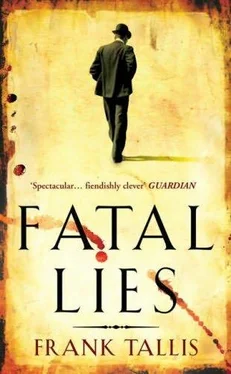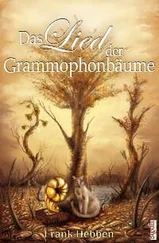Frank Tallis - Fatal Lies
Здесь есть возможность читать онлайн «Frank Tallis - Fatal Lies» весь текст электронной книги совершенно бесплатно (целиком полную версию без сокращений). В некоторых случаях можно слушать аудио, скачать через торрент в формате fb2 и присутствует краткое содержание. Жанр: Исторический детектив, на английском языке. Описание произведения, (предисловие) а так же отзывы посетителей доступны на портале библиотеки ЛибКат.
- Название:Fatal Lies
- Автор:
- Жанр:
- Год:неизвестен
- ISBN:нет данных
- Рейтинг книги:3 / 5. Голосов: 1
-
Избранное:Добавить в избранное
- Отзывы:
-
Ваша оценка:
- 60
- 1
- 2
- 3
- 4
- 5
Fatal Lies: краткое содержание, описание и аннотация
Предлагаем к чтению аннотацию, описание, краткое содержание или предисловие (зависит от того, что написал сам автор книги «Fatal Lies»). Если вы не нашли необходимую информацию о книге — напишите в комментариях, мы постараемся отыскать её.
Fatal Lies — читать онлайн бесплатно полную книгу (весь текст) целиком
Ниже представлен текст книги, разбитый по страницам. Система сохранения места последней прочитанной страницы, позволяет с удобством читать онлайн бесплатно книгу «Fatal Lies», без необходимости каждый раз заново искать на чём Вы остановились. Поставьте закладку, и сможете в любой момент перейти на страницу, на которой закончили чтение.
Интервал:
Закладка:
Liebermann imagined an icy, clenched fist squeezing the child's heart. He struck a pianissimo chord-and, holding it, waited for the last, devastating line of the song to be delivered.
But it did not come.
Rheinhardt was still gazing into the distance, now seemingly insensible of his actual surroundings.
Liebermann waited patiently until the inspector started again and finally produced the delayed recitativo.
“In seinen Armen das Kind war tot.”
In his arms the child was dead…
The words were half-spoken, loosely timed, and heavy with despair. The sound that Rheinhardt produced was hollow-empty and croaking. Thus released, Liebermann played the forceful two-chord cadence that brought Schubert's Erlkonig to a precipitate end. Its abruptness left a bleak silence-as if the music had been snatched away like the boy's life in Goethe's poem.
“I do apologize,” said Rheinhardt. “I think my last entry was a little late.”
“A little,” said Liebermann, “but your performance was…” He paused to select an appropriate superlative. “Operatic!”
As was their custom, the two men retired to the smoking room for brandy and cigars. After enjoying a few moments of quiet contemplation, Liebermann said: “This evening, you will-of course-be wishing to present me with the facts relating to the mysterious death of a young boy.”
Rheinhardt coughed into his drink. He had never quite got used to his friend's habit of telling him what he was about to say.
“Your performance of Loewe's Erlkonig,” Liebermann continued, “was curiously committed, given that it is not great music. This suggested to me the presence of a memory-or memories-finding a sympathetic correspondence in Goethe's poetry. My suspicions were confirmed when you placed Schubert's Erlkonig on the music stand instead of Der Doppelganger. As Professor Freud has explained, such bungled actions often have a deeper significance.
“Once again, your performance was compelling; however, by the time you had reached the final bars, the contents of your unconscious-stirred by Schubert's genius-were rising from the depths… You became distracted, and subsequently missed your entry. Indeed, you were so preoccupied that your silence lasted for two whole measures!”
“Two?” said Rheinhardt, skeptically.
“At least!” Liebermann insisted. “The Erlkonig describes the unnatural death of a child. One does not have to be a very great psychologist to connect the subject of Goethe's ballad with events that might have transpired in the real world. I simply supposed that your premature departure from the ball on Friday evening was for the purpose of investigating a child's death-and most likely under mysterious circumstances.”
Rheinhardt produced a smoke ring, through which he observed the flames of the fire.
“Well, Herr Doctor-you are absolutely correct. On Friday evening I did investigate the death of a child. A fifteen-year-old boarder at Saint Florian's military school.”
“Saint Florian's? Where's that?”
“Up in the woods.”
“Ah,” said Liebermann, showing evident signs of satisfaction. “That makes perfect sense.”
“I beg your pardon?”
“The Erlkonig. The father and son ride through a wood.”
Rheinhardt stubbed out his cigar.
“Please, do continue,” Liebermann added.
“Saint Florian's is situated close to the small village of Aufkirchen-built on the site of a religious foundation of the same name. Some of the original building still survives behind the new Gothic facade-old cloisters, a chapel, and so forth. I've been told that the school attracts the less academically gifted sons of well-heeled families.”
Liebermann filled Rheinhardt's empty glass. The inspector thanked him, and recounted the general facts of the investigation. He summarized the statements of Nurse Funke and the three masters: Eichmann, Becker, and Gartner. He then opened his case and removed a thick brown envelope. Inside were photographs, which he passed to his friend.
The boy, Thomas Zelenka, lying on the infirmary bed.
A school laboratory.
The surface of a bench covered with bottles, dishes, and test tubes.
They were not particularly clear photographs. Most were dark and grainy.
A notebook and an untouched pastry.
“What kind of experiments was the boy doing?” Liebermann asked.
“He was looking at the effects of mixing vinegar with certain chemical compounds. We took samples and had them analyzed. The findings were unremarkable.”
“And what did the school doctor have to say?”
“Nothing. He arrived after the boy's body had been removed. A tree was blocking the main road, and his driver-like ours-got lost.”
The next image showed Zelenka's naked body in the morgue. Under the bright electric light, his features and physique were more clearly defined.
“So, how did he die-exactly?”
Rheinhardt shook his head. “We don't know. Professor Mathias couldn't find anything wrong with him.”
“He just… died?”
“Yes.”
“In which case, I would have expected Professor Mathias to assume the presence of a subtle pathological process and ascribe the boy's death to natural causes.”
“Which is precisely what Professor Mathias did.”
“Then why are you treating the boy's death as suspicious?”
Rheinhardt grimaced. “Natural causes! Can a boy of fifteen really die of natural causes?”
“It is unusual, but yes, it can happen. One can speculate-tiny hemorrhages, deep in the brain, for example. They are exceedingly difficult to identify. A thorough microscopic analysis of transverse sections might reveal something-though one can never be sure. Then there are pulmonary anomalies…”
“Look at the next photograph.”
Liebermann picked up the image and tilted it in the lamplight.
A metal ruler showed the lengths of several faint white lines.
“What is it?”
“Scar tissue. About here.” Rheinhardt indicated the location by touching his chest. “According to Mathias, the wounds have been repeatedly reopened with a razor.”
The following photograph was equally puzzling: a crisscross pattern of darker lines.
“Cuts,” said Rheinhardt. “Found on the boy's torso, under his left arm.”
Liebermann considered the image for a few moments before examining the final photograph, which showed the boy's genitals-pulled to one side by the pathologist's hand. The displacement of these organs revealed three deep incisions in the pale flesh of Zelenka's upper thigh.
“Were any of the wounds infected?”
“Mathias said that the scarring on the boy's chest showed signs of past infection, but nothing recent. The other wounds were clean. You are no doubt wondering if these injuries are connected with his death. It seems not. The schoolmasters said the boy was perfectly healthy. He showed none of the symptoms associated with blood poisoning.”
“What about blood loss?”
“All the recent wounds had been dressed. There were no signs of excessive bleeding or dehydration.”
Liebermann arranged the photographs in a neat pile and stroked the straight edges.
“Then, it looks like the boy has either been tortured or… he has taken part in some bizarre rite of initiation.”
“Scars are deemed a sign of honor and distinction among dueling fraternities.”
“Yes, but only if those scars were acquired while in pursuit of what is termed satisfaction. This scarring”-Liebermann tapped the photographs-”is of a very different kind.” The young doctor lit a cigar and eased back into his chair. “The oldest wounds are to be found on the victim's chest. More recently the boy was cut under his arm and on his upper thigh. The latter two areas seem to have been selected for the purpose of concealment. But if so, why was concealment not a consideration when the first wounds were inflicted?”
Читать дальшеИнтервал:
Закладка:
Похожие книги на «Fatal Lies»
Представляем Вашему вниманию похожие книги на «Fatal Lies» списком для выбора. Мы отобрали схожую по названию и смыслу литературу в надежде предоставить читателям больше вариантов отыскать новые, интересные, ещё непрочитанные произведения.
Обсуждение, отзывы о книге «Fatal Lies» и просто собственные мнения читателей. Оставьте ваши комментарии, напишите, что Вы думаете о произведении, его смысле или главных героях. Укажите что конкретно понравилось, а что нет, и почему Вы так считаете.












